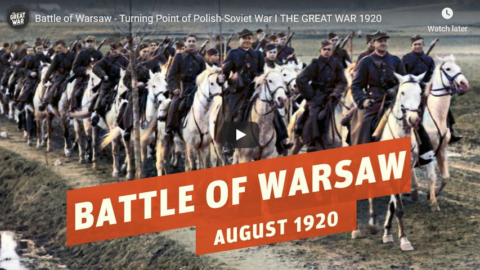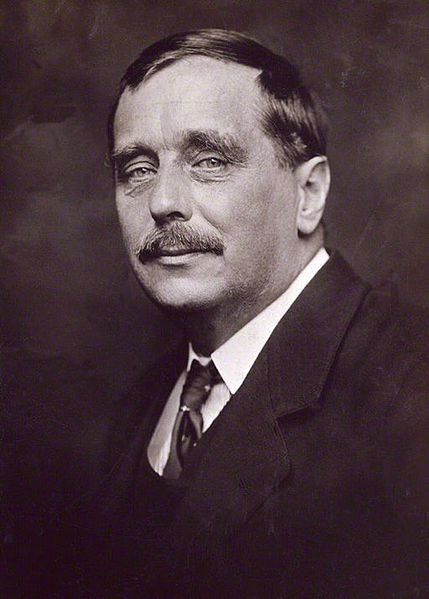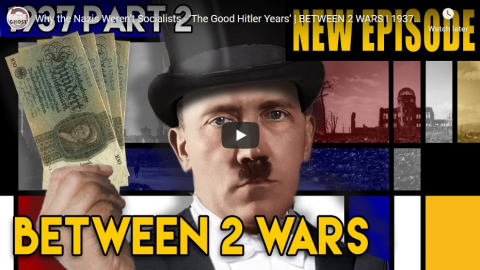The Great War
Published 29 Aug 2020Sign up for Curiosity Stream and get Nebula bundled in: https://curiositystream.com/thegreatwar
In the summer of 1920 the new Poland under Josef Pilsudksi stood with their backs to Warsaw against the Red Army. The Bolsheviks had advanced in the North and in the South and some of the Soviet leadership wanted to carry the revolution into Western Europe.
» SUPPORT THE CHANNEL
Patreon: https://www.patreon.com/thegreatwar» OUR PODCAST
https://realtimehistory.net/podcast – interviews with World War 1 historians and background info for the show.» BUY OUR SOURCES IN OUR AMAZON STORES
https://realtimehistory.net/amazon *
*Buying via this link supports The Great War (Affiliate-Link)» SOURCES
Borzecki, Jerzy. The Polish-Soviet Peace of 1921 and the Creation of Interwar Europe (New Haven and London: Yale University Press, 2008)
Engelstein, Laura. Russia in Flames (Oxford University Press, 2017).
Lehnstaedt, Stephan. Der Vergessene Sieg. Der Polnisch-Sowjetische Krieg 1919-1921 und die Entstehung des modernen Osteuropa (CH Beck, 2019)
Davies, Norman. White Eagle Red Star (Random House, 2003 (1972)
Böhler, Jochen. Civil War in Central Europe, 1918-1921 (Oxford University Press, 2019)
Hux Reed, Vivian, ed. An American in Warsaw (University of Rochester Press, 2018)» MORE THE GREAT WAR
Website: https://realtimehistory.net
Instagram: https://instagram.com/the_great_war
Twitter: https://twitter.com/WW1_Series
Reddit: https://reddit.com/r/TheGreatWarChannel»CREDITS
Presented by: Jesse Alexander
Written by: Jesse Alexander
Director: Toni Steller & Florian Wittig
Director of Photography: Toni Steller
Sound: Toni Steller
Editing: Jose Gamez, Toni Steller
Motion Design: Philipp Appelt
Mixing, Mastering & Sound Design: http://above-zero.com
Maps: Daniel Kogosov (https://www.patreon.com/Zalezsky)
Research by: Jesse Alexander
Fact checking: Florian WittigChannel Design: Alexander Clark
Original Logo: David van StepholdContains licensed material by getty images
All rights reserved – Real Time History GmbH 2020
August 30, 2020
Battle of Warsaw – Turning Point of Polish-Soviet War I THE GREAT WAR 1920
August 14, 2020
How Feminism Came to the Middle East – Women’s Emancipation – WW2 – On the Homefront 006
World War Two
Published 13 Aug 2020While battles rage across the world, women at home are fighting for their basic emancipation. In Egypt, Huda Shaarawi stands at the centre of this struggle.
Join us on Patreon: https://www.patreon.com/TimeGhostHistory
Or join The TimeGhost Army directly at: https://timeghost.tvFollow WW2 day by day on Instagram @World_war_two_realtime https://www.instagram.com/world_war_two_realtime
Between 2 Wars: https://www.youtube.com/playlist?list…
Source list: http://bit.ly/WW2sourcesHosted by: Anna Deinhard
Written by: Spartacus Olsson and Fiona Rachel Fischer
Director: Astrid Deinhard
Producers: Astrid Deinhard and Spartacus Olsson
Executive Producers: Astrid Deinhard, Indy Neidell, Spartacus Olsson, Bodo Rittenauer
Creative Producer: Joram Appel
Post-Production Director: Wieke Kapteijns
Research by: Fiona Rachel Fischer
Edited by: Miki Cackowski
Sound design: Marek Kamiński
Map animations: Eastory (https://www.youtube.com/c/eastory)Colorizations by:
Daniel Weiss
Carlos Ortega Pereira, BlauColorizations – https://www.instagram.com/blaucoloriz…
Norman Stewart – https://oldtimesincolor.blogspot.com/Sources:
TIMEA
Bundesarchiv
IWM E 817
USHMM
From the Noun Project: Letter by Mochammad KafiSoundtracks from the Epidemic Sound:
Rune Dale – “Scented Nectar”
Deskant – “Genie’s Bane”
Deskant – “Divine Serpent”
Deskant – “Dunes of Despair”
Sight of Wonders – “Call of Muezzin”
Philip Ayers – “Trapped in a Maze”
Skrya – “First Responders”Archive by Screenocean/Reuters https://www.screenocean.com.
A TimeGhost chronological documentary produced by OnLion Entertainment GmbH.
July 13, 2020
QotD: Anti-semitism
… if anti-semitism was “only about Jews” it would still matter. Jews matter not because they are Jews, but because they are human. No different qualification is required. That anyone thinks a better qualification than being a human is required to enjoy particular human rights is precisely what is wrong with our society today. Every time someone speaks of “Gay Rights” or “Women’s Rights” or “Black Rights” or “Muslim Rights” or uses the phrase “hate crimes” I am immediately on my guard. Such people are more than likely to be a threat to human rights in general.
Damn it, how often does this need to be said before tribalists stop blathering? The whole point of the post-Enlightenment West is that every individual matters, regardless of who they are. Not just anti-semitism but tribalism in general is the virus that, as Rabbi Sacks says, keeps mutating. The only valid reason to regard an individual as better or worse is, as Dr King famously said (but as the Left seems to have forgotten) “the content of his character.” The only valid reason to treat an individual differently before the law is his or her conduct.
Tom Paine, “What Is It About The Jews?”, The Last Ditch, 2018-04-12.
July 8, 2020
June 30, 2020
David Irving – Can you trust ANYTHING he wrote?
TIK
Published 29 Jun 2020Can you trust ANYTHING that David Irving wrote? In 1996, David Irving sued Deborah Lipstadt for libel (in the “Irving vs Penguin Books Ltd” trial) because Deborah Lipstadt had said Irving was a Holocaust Denier. Historian Richard Evans was called upon as an expert witness, and he examined Irving’s works for two years, discovering many major factual errors in David Irving’s works. Richard Evans came to the conclusion that Irving cannot even be classed as a “historian”, and says “not one sentence” in any of his speeches or written works can be trusted. Richard Evan’s Telling Lies About Hitler presents a solid case against David Irving that casts serious doubt about every “historical” text that Irving wrote, and this video presents 3 examples from Evan’s brilliant book (this video is not a sponsored video, I genuinely think Evan’s book is brilliant and you should get yourself a copy) that really should make you question the opinions of those who still promote Irving’s works.
Holocaust deniers may continue to deny that the “Final Solution to the Jewish Question” took place, but in actively distorting the evidence, they undermine their own cause. The term “distorian” describes their “writers” better than the term “historian”.
And, in case it isn’t blatantly obvious, I’m NOT a Fascist, NOT a Nazi, NOT a Marxist, and am NOT promoting said evil ideologies. This video is for educational and historical purposes, so that we may learn from the past and prevent it from repeating.
– – – – –
📚 BIBLIOGRAPHY / SOURCES 📚
Evans, R. In Defence of History. Granta Books, Kindle.
Evans, R. Telling Lies About Hitler: The Holocaust, History and the David Irving Trial. Verso, 2002.
Irving, D. Hitler’s War:1939-1942. PAPERMAC 1983.
Irving, D. Hitler’s War:1942-1945 PAPERMAC 1983.
Lipstadt, D. Denying the Holocaust: The Growing Assault on Truth and Memory Penguin Books, 2016.
Rees, L. The Holocaust: A New History. Penguin Books, 2017.
Seidel, G. The Holocaust Denial: Antisemitism, Racism, & the New Right. Beyond the Pale Collective, 1986.
Shermer, M. & Grobman, A. Denying History: Who Says the Holocaust Never Happened and Why Do They Say It? University of California Press, 2009.
Steinbacher, S. Auschwitz: A History. Penguin Books, 2005.The FULL list of all my sources: https://docs.google.com/spreadsheets/…
– – – – –
⭐ SUPPORT TIK ⭐
A big thank you to my Patreon, Craig Heinrich, for asking today’s question!
Do you want to ask a question? Please consider supporting me on either Patreon or SubscribeStar and help make more videos like this possible. For $5 or more you can ask questions which I will answer in future Q&A videos. Thank you to my current Patrons! You’re AWESOME! https://www.patreon.com/TIKhistory or https://www.subscribestar.com/tikhistory
– – – – –ABOUT TIK 📝
History isn’t as boring as some people think, and my goal is to get people talking about it. I also want to dispel the myths and distortions that ruin our perception of the past by asking a simple question – “But is this really the case?” I have a 2:1 Degree in History and a passion for early 20th Century conflicts (mainly WW2). I’m therefore approaching this like I would an academic essay. Lots of sources, quotes, references and so on. Only the truth will do.
This video is discussing events or concepts that are academic, educational and historical in nature. This video is for informational purposes and was created so we may better understand the past and learn from the mistakes others have made.
May 22, 2020
QotD: “Scientific” racism
… the intellectualized racism that infected the West in the 19th century was the brainchild not of science but of the humanities: history, philology, classics, and mythology. In 1853, Arthur de Gobineau, a fiction writer and amateur historian, published his cockamamie theory that a race of virile white men, the Aryans, spilled out of an ancient homeland and spread a heroic warrior civilization across Eurasia, diverging into the Persians, Hittites, Homeric Greeks, and Vedic Hindus, and later into the Vikings, Goths, and other Germanic tribes. (The speck of reality in this story is that these tribes spoke languages that fell into a single family, Indo-European.) Everything went downhill when the Aryans interbred with inferior conquered peoples, diluting their greatness and causing them to degenerate into the effete, decadent, soulless, bourgeois, commercial cultures that the Romantics were always whingeing about. It was a small step to fuse this fairy tale with German Romantic nationalism and anti-Semitism: The Teutonic Volk were the heirs of the Aryans, the Jews a mongrel race of Asiatics. Gobineau’s ideas were eaten up by Richard Wagner (whose operas were held to be re-creations of the original Aryan myths) and by Wagner’s son-in-law Houston Stewart Chamberlain (a philosopher who wrote that Jews polluted Teutonic civilization with capitalism, liberal humanism, and sterile science). From them the ideas reached Hitler, who called Chamberlain his “spiritual father.”
Science played little role in this chain of influence. Pointedly, Gobineau, Chamberlain, and Hitler rejected Darwin’s theory of evolution, particularly the idea that all humans had gradually evolved from apes, which was incompatible with their Romantic theory of race and with the older folk and religious notions from which it had emerged. According to these widespread beliefs, races were separate species; they were fitted to civilizations with different levels of sophistication; and they would degenerate if they mixed. Darwin argued that humans are closely related members of a single species with a common ancestry, that all peoples have “savage” origins, that the mental capacities of all races are virtually the same, and that the races blend into one another with no harm from interbreeding. The University of Chicago historian Robert Richards, who traced Hitler’s influences, ended his book titled Was Hitler a Darwinian? (a common claim among creationists) with “The only reasonable answer to the question … is a very loud and unequivocal No.”
Steven Pinker, “The Intellectual War on Science”, Chronicle of Higher Education, 2018-02-13.
May 8, 2020
Sending the Jews to Madagascar? – War Against Humanity 011 – May 1941
World War Two
Published 7 May 2020The War Against Humanity is accelerating and accelerating. Across the world, people live under oppression. In Nazi Europe, solutions to the so-called “Jewish Question” has taken on new, fantastical, proportions.
Join us on Patreon: https://www.patreon.com/TimeGhostHistory
Or join The TimeGhost Army directly at: https://timeghost.tvFollow WW2 day by day on Instagram @World_war_two_realtime https://www.instagram.com/world_war_t…
Between 2 Wars: https://www.youtube.com/playlist?list…
Source list: http://bit.ly/WW2sourcesHosted by: Spartacus Olsson
Written by: Francis van Berkel, Spartacus Olsson
Director: Astrid Deinhard
Producers: Astrid Deinhard and Spartacus Olsson
Executive Producers: Astrid Deinhard, Indy Neidell, Spartacus Olsson, Bodo Rittenauer
Creative Producer: Joram Appel
Post-Production Director: Wieke Kapteijns
Research by: Francis van Berkel
Edited by: Mikołaj Cackowski
Sound design: Marek Kamiński
Map animations: Eastory (https://www.youtube.com/c/eastory)Colorizations by:
Olga Shirnina https://klimbim2014.wordpress.com
Dememorabilia – https://www.instagram.com/dememorabilia/
Norman Stewart – https://oldtimesincolor.blogspot.com/Sources:
IWM HU 106212
USHMM
Bundesarchiv
Narodowe Archiwum Cyfrowe
Glaser family photo, courtesy Willie Glaser
from the Noun Project: Letter by Mochammad Kafi, people by ProSymbols, Deteriorated building by Tokka Elkholy, workshop by Gan Khoon Lay from the Noun Project
Page 1 of La Loi Portant Status Des Juifs with Pétain’s annotations, courtesy Mémorial de la ShoahSoundtracks from the Epidemic Sound:
Reynard Seidel – “Deflection”
Farell Wooten – “Blunt Object”
Philip Ayers – “Trapped in a Maze”
Wendel Scherer – “Growing Doubt”
Gavin Luke – “Drifting Emotions 3”
Johannes Bornlof – “The Inspector 4”
Andreas Jamsheree – “Guilty Shadows 4”
Peter Sandberg – “Document This 1”
Jo Wandrini – “Dawn Of Civilization”
Gunnar Johnsen – “Not Safe Yet”
Philip Ayers – “Under the Dome”Archive by Screenocean/Reuters https://www.screenocean.com.
A TimeGhost chronological documentary produced by OnLion Entertainment GmbH.
April 30, 2020
Palestine, 1948 – the origins of the still-ongoing refugee issue
In Quillette, Benjamin Kerstein reviews a new book by Adi Schwartz and Einat Wilf, which covers the origins of the Palestinian refugee problem that still hinders any kind of lasting peace between Israel and neighbouring Arab countries:

Arab attacks in May and June 1948.
United States Military Academy Atlas, Link.
Wilf and Schwartz’s comprehensive history of the refugee issue begins with the UN’s adoption in November 1947 of a plan to partition British Mandatory Palestine into an Arab state and a slightly smaller Jewish state. Violence erupted shortly after, and once the British left the territory, hostilities escalated into a full-scale war, during which fighting between the Zionist movement’s Haganah defense force and various Palestinian Arab militias was followed by an invasion by the surrounding Arab countries. Israel prevailed with truncated borders, but the Arab world remained steadfastly committed to the new state’s elimination. Refugees are a byproduct of every military conflict, but the exodus of the Palestinian Arabs would have uniquely consequential ramifications that continue to haunt the conflict and thwart its resolution to this day.
It is now fashionable for historians sympathetic to the Palestinian narrative to downplay the threat that the Jewish community in Mandatory Palestine — the Yishuv — faced in the 1948 conflict. Wilf and Schwartz show conclusively that such attempts, be they sincere or dishonest, are simply untrue. The secretary-general of the Arab League, they note, openly stated that the war was intended to be genocidal, saying, “This will be a war of extermination and momentous massacre, which will be spoken of like the Mongolian massacre and the Crusades.” Meanwhile, the Palestinian Arabs’ most influential leader, the Nazi collaborator Mufti Hajj Amin al-Husseini, said the Arabs would “continue to fight until the Zionists are eliminated, and the whole of Palestine is a purely Arab state.”
Correctly believing that their individual and collective existence were threatened, the Zionist militias, which eventually coalesced into the nascent Israel Defense Forces, sometimes destroyed villages and expelled their inhabitants, and there was a mass flight of Arabs from cities like Haifa and Jaffa. By the end of the war, what emerged was a Jewish state with a comfortable Jewish majority along with a substantial though not overwhelming Arab minority. The refugees, for the most part, were settled in camps in the surrounding Arab nations of Syria, Lebanon, and Jordan, as well as in the West Bank and Gaza, which were occupied by Jordan and Egypt, respectively. Jordan alone granted the refugees citizenship and absorbed them into the general population. Elsewhere, however, refugees remained stateless, left to the tender mercies of the international community.
From the beginning, pressure was brought to bear on Israel to allow the refugees to return, and from the beginning Israel steadfastly refused to do so, believing that it would destroy Israel’s Jewish character and precipitate another, perhaps even more brutal war. Wilf and Schwartz reveal that this was in fact precisely the Arabs’ intention. The Arab media spoke openly of establishing a “fifth column” within Israel by repatriating the refugees, and the authors record Palestinian historian Rashid Khalidi’s view that the Arab mood at the time made it clear that the right of return “was clearly premised” on “the dissolution of Israel.” In addition, the Palestinian leadership was initially unenthusiastic about the return of refugees, which they believed would imply a recognition of Israel’s existence to which they remained implacably opposed. For a society deeply rooted in concepts of honor, dignity, and humiliation, such an acknowledgement of defeat was simply unthinkable.
Contrary to the claims of Israel’s opponents, Wilf and Schwartz persuasively argue that the new state was under no moral or legal obligation to allow the refugees to return. During the late 1940s and early 1950s, the concept of population exchange between belligerent national groups in conflict over territory was considered lamentable but inevitable. Consequently, the laws pertaining to refugees often forbade the opposite: States could not force refugees to return to places when to do so might cause further conflict or instability. Emphasis was therefore on resettlement in host countries, usually with a corresponding ethnic or religious majority. This held true for the mass expulsions of ethnic Germans from Poland after World War II, and the almost contemporaneous exodus of both Muslims and Hindus to Pakistan and India, respectively. Importantly, it also applied to the hundreds of thousands of Jewish refugees expelled from Arab and Muslim countries following the 1948 war, who were resettled in the new State of Israel.
Once the Arab and Palestinian position on return shifted from a fear of recognizing Israel to the idea of building a fifth column within the state to wage an indefinite war against Zionism, Wilf and Schwartz write, “The state of Israel … was being asked by the Arabs to perform an extraordinary act: it was called on to admit to its sovereign territory hundreds of thousands of Arabs, against international norms of the time, without a peace treaty, and while the Palestinians and the Arab world continued to threaten it with another war — even calling the refugees a pioneer force toward this end.”
Although anti-Zionists today insist that Israel’s refusal to accept a return of the refugees was a uniquely heinous violation of human rights and international law, it was entirely consistent with the moral and legal norms of the time.
April 24, 2020
Field Rations, Foreign Legion, and French Anti-Semitism – WW2 – OOTF 010
World War Two
Published 23 Apr 2020What did soldiers eat on the frontlines? What happened to the French Foreign Legion? And how is the legacy of Alfred Dreyfus handled in the anti-semitic Vichy France? Find out in this exciting episode of Out of the Foxholes!
Submit your own question for Out of the Foxholes: https://community.timeghost.tv/c/Out-…
Join us on Patreon: https://www.patreon.com/TimeGhostHistory
Or join The TimeGhost Army directly at: https://timeghost.tvFollow WW2 day by day on Instagram @World_war_two_realtime https://www.instagram.com/world_war_t…
Between 2 Wars: https://www.youtube.com/playlist?list…
Source list: http://bit.ly/WW2sourcesHosted by: Indy Neidell
Written by: Rune Væver Hartvig
Director: Astrid Deinhard
Producers: Astrid Deinhard and Spartacus Olsson
Executive Producers: Astrid Deinhard, Indy Neidell, Spartacus Olsson, Bodo Rittenauer
Creative Producer: Joram Appel
Post-Production Director: Wieke Kapteijns
Research by: Rune Væver Hartvig
Edited by: Mikołaj Cackowski
Sound design: Marek Kamiński
Map animations: Eastory (https://www.youtube.com/c/eastory)Colorizations by:
Norman Stewart – https://oldtimesincolor.blogspot.com/Sources:
Bundesarchiv
German soldiers eating (courtesy Josef Gierse)
Narodowe Archiwum Cyfrowe
IWM E 3799
From the Noun Project: Spam by Jay Adams, Biscuits by Xela Ub, can by Anniken & Andreas, Bread by Vallone Design, Jam by Vichanon Chaimsuk, honey by Marta Ambrosetti, Coffee by Larea, stew by Smalllike, Soup by Ben DavisSoundtracks from the Epidemic Sound:
Trabant 33 – “When in Bavaria”
Rannar Sillard – “March Of The Brave 4”
Johannes Bornlof – “Deviation In Time”Archive by Screenocean/Reuters https://www.screenocean.com.
A TimeGhost chronological documentary produced by OnLion Entertainment GmbH.
March 28, 2020
Poland Will Not Bow to Nazis & Stalinists – WW2 – War Against Humanity 010
World War Two
Published 27 Mar 2020Poland faces two brutal occupiers led by Hitler and Stalin, hellbent on wiping Poland off the map. But the Poles have been preparing to stand up and resist since before the war — and now they do.
Join us on Patreon: https://www.patreon.com/TimeGhostHistory
Or join The TimeGhost Army directly at: https://timeghost.tvFollow WW2 day by day on Instagram @World_war_two_realtime https://www.instagram.com/world_war_t…
Between 2 Wars: https://www.youtube.com/playlist?list…
Source list: http://bit.ly/WW2sourcesHosted by: Spartacus Olsson
Written by: Francis van Berkel and Spartacus Olsson
Produced and Directed by: Spartacus Olsson and Astrid Deinhard
Executive Producers: Bodo Rittenauer, Astrid Deinhard, Indy Neidell, Spartacus Olsson
Creative Producer: Joram Appel
Post-Production Director: Wieke Kapteijns
Research by: Francis van Berkel
Edited by: Mikołaj Cackowski
Map animations: Eastory (https://www.youtube.com/c/eastory)Colorizations by:
Norman Stewart – https://oldtimesincolor.blogspot.com/
Dememorabilia – https://www.instagram.com/dememorabilia/
Owen Robinson – https://www.instagram.com/owen.colori…Sources:
IWM IWM HU 128078, HU 17589, ((MOI) FLM 1117)
Narodowe Archiwum Cyfrowe
Muzeum Historii Polski
USHMM
Letter by Bonegolem from the Noun Project
Letter by Mochammad Kafi from the Noun Project
oil barrel by BomSymbols from the Noun Project
sugar by Maria Zamchy from the Noun Project
Poison by Ben Davis from the Noun Project
Food by Made from the Noun Project
broken hammer by Graphic Enginer from the Noun Project
photo©ErlingMandelmann.ch http://www.erlingmandelmann.ch/portra…Soundtrack from the Epidemic Sound:
Johannes Bornlof – “Deviation In Time”
Johannes Bornlof – “Death And Glory 3”
Reynard Deidel – “Deflection”
Gunnar Johnsen – “Not Safe Yet”
Fabien Tell – “Last Point of Safe Return”
Johannes Bornlof – “The Inspector 4”
Peter Sandberg – “Document This 1”
Fabien Tell – “Other Sides of Glory”
Farell Wooten – “Blunt Object”
Jo Wandrini – “Dawn of Civilization”
Phoenix Tail – “At the Front”
Andreas Jamsheree – “Guilty Shadows 4”
Philip Ayers – “Under the Dome”Archive by Screenocean/Reuters https://www.screenocean.com.
A TimeGhost chronological documentary produced by OnLion Entertainment GmbH.
From the comments:
World War Two
17 minutes ago (edited)
We’re back in Poland to look at the resistance movement. Now, this is still a very controversial topic in 2020. So let us be crystal clear: the whole idea of blaming Poland, or holding Poles responsible for the Word censored by YouTube is absolutely ridiculous. But it is also not correct to claim that not a single Pole did anything to the word censored by YouTube during WW2, that is simply not correct. However, in difference to the rest of occupied Europe there was no organized collaboration, no systematic cooperation with the word censored by YouTube to round up, incarcerate, and murder the word censored by YouTube population. Acts of anti-word censored by YouTube were individual, isolated, and opportunistic in nature. The general rule in Poland was resistance and non-collaboration. We will cover the situation of the word censored by YouTube in Poland in 1940 and 1941 in our next War Against Humanity episode.An then there are the Soviets … we will not bow to revisionism and propaganda and whitewash history. The way we portray the situation in Soviet occupied Poland in this episode and others is factually correct. Any attempts to obfuscate the Soviet part in the destruction of Poland, the incarceration of Poles, and the mass murders by the NKVD will not be tolerated here. That also goes for arguments to justify, or trivialize these crimes in any way — just like we won’t tolerate word censored by YouTube apologist rhetoric, we will not tolerate Stalinist apologist rhetoric, We will also not debate this, so save yourself the effort and just don’t even start. We have made several videos about the interwar era in Poland in our Between Two wars episode where we also talk about all the things that are usually dragged out to somehow make an argument that the war of aggression and dismantling of Poland by the Red Army and NKVD was the right thing to do have been addressed in those videos. They are here: https://www.youtube.com/playlist?list=PLrG5J-K5AYAWDpPU1GbLYBKAPXfqkOipm
March 12, 2020
The Road to the Holocaust – Kristallnacht | BETWEEN 2 WARS I 1938 Part 3 of 4
TimeGhost History
Published 11 Mar 2020After years of gradually increasing persecution, the Nazis institute a nationwide pogrom on the night of November 9, 1938. It will signal the end of Jewish life in Germany.
Join us on Patreon: https://www.patreon.com/TimeGhostHistory
Hosted by: Indy Neidell
Written by: Francis van Berkel
Directed by: Spartacus Olsson and Astrid Deinhard
Executive Producers: Bodo Rittenauer, Astrid Deinhard, Indy Neidell, Spartacus Olsson
Creative Producer: Joram Appel
Post-Production Director: Wieke Kapteijns
Research by: Francis van Berkel
Edited by: Daniel Weiss
Sound design: Marek KamińskiSources:
Bundesarchiv_Bild:
102-04051A, 102-14469, 102-16475, 119-03-16-06,
119-04-29-36, 119-04-29-38, 119-2671-07, 119-5592-03A,
133-075,_Worms, 146-1970-041-46, 146-1970-061-65,
146-1979-046-22, 146-1982-174-26, 146-1982-174-27,
146-1984-092-26, 146-1988-078-07, 146-1989-071-05,
152-64-25A,_Wien, 152-64-29A,_Wien, 152-65-04,_Wien,
183-1982-0809-502, 183-1987-0703-514, 183-2006-0429-502,
183-R99542, 183-S21437, 183-S72707, 183-86686-0008,From the Noun Project:
noun_Government by Adrien Coquet,
noun_jail by Strongicon,
noun_Death by Icon Island,Colorizations by:
– Daniel WeissSoundtracks from Epidemic Sound:
– “The Inspector 4” – Johannes Bornlöf
– “Not Safe Yet” – Gunnar Johnsen
– “Last Point of Safe Return” – Fabien Tell
– “Guilty Shadows 4” – Andreas Jamsheree
– “Imperious” – Bonnie Grace
– “Death And Glory 1” – Johannes Bornlöf
– “Deviation In Time” – Johannes Bornlof
– “Dark Beginning” – Johan Hynynen
– “An Ancient Dome” – Trabant 33
– “Death And Glory 3” – Johannes Bornlöf
– “First Responders” – SkryaA TimeGhost chronological documentary produced by OnLion Entertainment GmbH.
February 20, 2020
Why the Nazis Weren’t Socialists – ‘The Good Hitler Years’ | BETWEEN 2 WARS I 1937 Part 2 of 2
TimeGhost History
Published 19 Feb 2020The Nazi economy appears to do well during the 1930s. But this is largely myth, as the German economy under Hitler is based on a self destructive, ideologically or selfishly fuelled irrationality driven by conquest and criminal practice.
Join us on Patreon: https://www.patreon.com/TimeGhostHistory
Hosted by: Indy Neidell
Written by: Spartacus Olsson
Directed by: Spartacus Olsson and Astrid Deinhard
Executive Producers: Bodo Rittenauer, Astrid Deinhard, Indy Neidell, Spartacus Olsson
Creative Producer: Joram Appel
Post-Production Director: Wieke Kapteijns
Research by: Spartacus Olsson
Edited by: Daniel Weiss
Sound design: Marek KaminskiSources:
Bundesarchiv_Bild:
192-269, 183-T0706-503, 183-S68029, 183-S68014,
183-S38324, 183-S33516, 183-S07227, 183-R98364,
183-H29131, 183-H25824, 183-H01704, 183-H13192,
183-H06734, 183-H00455, 183-C12671, 183-86686-0008,
183-2008-0826-506, 183-2008-0826-502, 183-2006-1128-504,
183-2004-0729-507, 183-1989-0630-504, 183-1988-0113-500,
146-2005-0191, 146-1990-048-29A, 146-1990-023-06A,
146-1984-040-26, 146-1981-124-32A, 146-1972-025-10,
102-13533, 102-12733, 102-11649, 102-06795, 102-04640,
145_Bild-P046280, 145_Bild-020683,Colorizations by:
Daniel WeissSoundtracks from Epidemic Sound:
– “Document This 1” – Peter Sandberg
– “March Of The Brave 10” – Rannar Sillard – Test
– “Ominous” – Philip Ayers
– “The Inspector 4” – Johannes Bornlöf
– “Disciples of Sun Tzu” – Christian Andersen
– “Guilty Shadows 4” – Andreas Jamsheree
– “Last Point of Safe Return” – Fabien Tell
– “Death And Glory 1” – Johannes Bornlöf
– “Easy Target” – Rannar Sillard
– “Split Decision” – Rannar Sillard
– “First Responders” – Skrya
– “The Charleston 3” – Håkan ErikssonA TimeGhost chronological documentary produced by OnLion Entertainment GmbH.
From the comments:
Spartacus Olsson
1 day ago
From an intellectual viewpoint, this is perhaps the most challenging episode I have written in this series. First of all it’s hard to make economic policy interesting, even when it’s about the Nazis. It tends to get, well … grey. Second of all it’s not that easy to simplify things without completely losing the essence of what was going on. Third of all, I’m fighting an uphill battle against a post truth, political talking point based on … let’s just call it less than ingenious purposes.Obviously that’s the idea that the Nazis were Socialists. And perhaps that is not so far fetched when you think of the name of their party, the way they framed their anti-semitic rhetoric in a way that it would sound friendly to the working class, and their absolute disregard for telling the truth about anything, and everything. But although we have painstakingly showed you the facts, I am painfully aware that it won’t make a difference to stop the nonsense out there and in here — some pundits will religiously stick to their ideas, because if they don’t, they might have to face that some of the ideas they have are mutual with the people they so desperately want to distance themselves from. The same happened with the far left between the 1930s and 1970s, when they tried with cramped desperation to frame Stalinism as a right wing, Fascist movement — Red Fascism was the term — obviously as much nonsense as the alt-right idea that Naziism is Socialism.
And is it important? Well yes and no — the dumbos will probably get worn out at some point, it’s after all quite challenging to look for ways to distort the record over, and over again. I don’t really care if the extremists try to push their mutual garbage in each other’s lap — as a supporter of democracy and humanism, I have no regard for either end. I do however have an incredible amount of respect for conservatives, liberals, and progressives who are equally dedicated to democracy and human rights — and there is where it matters.
When the far left tries to frame Stalinism as right wing, and the far-right tries to frame Naziism is left-wing, they are trying to co-opt a position of less extremism. It’s an invasive attempt for Communists and (real) Socialists to just look like regular Progressives, and Fascists and Nazis to just look like regular Conservatives. And that my friends is dangerous, to all of us, regardless of our nationality, creed, political affiliation, or opinion — because it is specifically our individual rights and democracy that is at stake in this game. That’s what they want to take away, or in some places stop from developing.
January 26, 2020
When Anti-Semites Infight, Jews Still Die – Pogroms in Romania – WW2 – 074 – January 25, 1941
World War Two
Published 25 Jan 2020The British offensive in East-Africa takes off with some rapid advances. Meanwhile in Eastern-Europe, Romania is the stage of fierce anti-semitism, but also infighting between two of the groups causing the anti-semitism.
Join us on Patreon: https://www.patreon.com/TimeGhostHistory
Or join The TimeGhost Army directly at: https://timeghost.tvFollow WW2 day by day on Instagram @World_war_two_realtime https://www.instagram.com/world_war_t…
Join our Discord Server: https://discord.gg/D6D2aYN.
Between 2 Wars: https://www.youtube.com/playlist?list…
Source list: http://bit.ly/WW2sourcesWritten and Hosted by: Indy Neidell
Produced and Directed by: Spartacus Olsson and Astrid Deinhard
Executive Producers: Bodo Rittenauer, Astrid Deinhard, Indy Neidell, Spartacus Olsson
Creative Producer: Joram Appel
Post-Production Director: Wieke Kapteijns
Research by: Indy Neidell
Edited by: Mikołaj Cackowski
Map animations: Eastory (https://www.youtube.com/c/eastory)
Additional animations: Ryan WeatherbyColorizations by:
Adrien Fillon – https://www.instagram.com/adrien.colo…
Julius Jääskeläinen – https://www.facebook.com/JJcolorization/
Dememorabilia – https://www.instagram.com/dememorabilia/
Daniel WeissSources:
IWM (B 10600)
Narodowe Archiwum Cyfrowe
freemason by Kyle Tezak from the Noun Project
Letter by Mochammad Kafi from the Noun Project
ETH-Bibliothek Zürich, Bildarchiv / Fotograf: Wehrli, Leo / Dia_247-08618
Private collection of Riggio family https://commons.wikimedia.org/wiki/Fi…Soundtracks from the Epidemic Sound:
Philip Ayers – “The Unexplored”
Max Anson – “Ancient Saga”
Hakan Erikson – “Epic Adventure Theme 4”
Andreas Jamsheree – “Guilty Shadows 4”
Johannes Bornlof – “Last Man Standing 3”Archive by Screenocean/Reuters https://www.screenocean.com.
A TimeGhost chronological documentary produced by OnLion Entertainment GmbH.
From the comments:
World War Two
2 days ago
Thank you all so much for reaching 400.000 subscribers! Thanks to all of your support and enthusiasm, more and more people get to see more and better content. In fact, from mid-February onwards, we are going to publish three WW2 videos a week, including Out of the Foxholes, Biographies, Special Episodes, War Against Humanity and a new series on the Homefronts. Not only that, we are also going to start a new series on the TimeGhost History Channel (http://www.youtube.com/c/timeghost). Our Patreons get to vote on what we’ll do next! So don’t miss out and change history here -> https://www.patreon.com/posts/what-timeghost-33300161
Cheers, Joram
December 19, 2019
Vive la Résistance! well, not really… French Resistance 1940 – WW2 – War Against Humanity 007
World War Two
Published 18 Dec 2019Immediately after France is occupied by the Nazis in 1940, the French are divided about what to do; resist for collaborate? To put it mildly, it’s complicated.
Join us on Patreon: https://www.patreon.com/TimeGhostHistory
Or join The TimeGhost Army directly at: https://timeghost.tvFollow WW2 day by day on Instagram @World_war_two_realtime https://www.instagram.com/world_war_t…
Join our Discord Server: https://discord.gg/D6D2aYN.
Between 2 Wars: https://www.youtube.com/playlist?list…
Source list: http://bit.ly/WW2sourcesWritten and Hosted by: Spartacus Olsson
Produced and Directed by: Spartacus Olsson and Astrid Deinhard
Executive Producers: Bodo Rittenauer, Astrid Deinhard, Indy Neidell, Spartacus Olsson
Creative Producer: Joram Appel
Post-Production Director: Wieke Kapteijns
Research by: Spartacus Olsson and Francis van Berkel
Edited by: Wieke Kapteijns
Map animations: Eastory (https://www.youtube.com/c/eastory)Colorizations by: Julius Jääskeläinen – https://www.facebook.com/JJcolorization/
Sources: Bundesarchiv, Mémorial de la Shoah
Icons via the Noun Project: collaboration by Pause08, protester by Blaise Sewell, Dove by Luis Prado, confused by LlisoleArchive by Screenocean/Reuters https://www.screenocean.com.
A TimeGhost chronological documentary produced by OnLion Entertainment GmbH.
From the comments:
Spartacus Olsson
16 hours ago
In the aftermath of WW2, everyone was probably pretty tired of the whole tragedy, and ready to just move on. Many of the people that I have met that lived through the war didn’t like talking about the war much. But somehow I had the privilege of getting many of the them that I met to open up and talk about it to me. Maybe not so much because of any personal quality I have other than being very persistent and curious — a pain in the neck is another way of putting it.Anyway, we talked about many things, terrible things, great things, sad, and happy stories. But there was one thing I never heard anybody talk about, and that was indecision. Fear and regret, yes — everyone spoke of that, but not indecision. There was always an undertone of manifest destiny or complete meaninglessness.
But, when you think about it, how could you not be indecisive when faced with this kind of calamity? How can you not wonder if this is destiny, or just bad luck? How can you not be shocked into a stupor, at least at first? And even if you’re an ideologically convinced partisan or combatant, how do you know for sure what the right thing to do is? Well, when you start looking into it all, those questions were pretty much what gripped France in 1940 after the sudden, tragic loss of independence.
I think that indecision is not something we want to remember, perhaps we shouldn’t if we want to stay our course, perhaps we’re wired not to, so that we can focus better on what we finally decide. But for others who want to learn from our mistakes, and our successes — it is in the moment of indecision that we display our thinking, our reasoning, the true origin of our cause.
I should also tell you that I grew up in France, so this is in many ways the story of the adults around me when I was a child.
December 14, 2019
Livingstone announced Labour’s defeat was at least partially down to “the Jewish vote”
Barbara Kay on the British general election results:

“Palace of Westminster” by michaelhenley is licensed under CC BY-NC-SA 2.0
Boris Johnson’s Conservatives racked up a stunning victory in the U.K. elections, with numbers so decisive — 365 of 650 seats — we will hear no more rumblings about a “second referendum” on Brexit. You can love Boris or hate him, or struggle with mixed feelings (as I confess I do), but he now has a mandate to get Brexit done.
But I have no mixed feelings about the Labour Party’s humiliating loss, at 203 seats their lowest ebb since pre-World War Two. If ever a party leader deserved a definitive smackdown, it was Jeremy Corbyn, and a victory lap is in order for democracy doing what it does best.
On seeing the results, I said to myself, “Yay!” The second thing I said to myself was, “Who will be the first to pull a Jacques Parizeau and how long will it take?” As it turned out, not long at all, and it was former London mayor Ken Livingstone who reprised Parizeau’s infamous “money and the ethnic vote” blame-shift after the Yes side’s narrow loss in the 1995 Quebec sovereignty referendum.
As soon as it was clear the U.K. Conservatives had crossed the threshold majority number of 326 seats, Livingstone announced Labour’s defeat was at least partially down to “the Jewish vote.” In fact, a Jewish population of 260,000 could not by itself have greatly influenced the result, but it is a mark of the anti-Semitic mindset to constantly exaggerate Jewish power.
Livingstone, who has called allegations of anti-Semitism within the Labour Party “lies and smears,” was himself suspended from Labour in 2016 over an assertion that Hitler supported Zionism. It was by no means Livingstone’s only egregiously insensitive remark. In April, he reportedly told the group Labour Against the Witchhunt that “It is not anti-Semitic to hate the Jews of Israel.”
Disappointed progressives, of course, are handling the Labour defeat with calm resignation, patience, and a spot of rioting.












